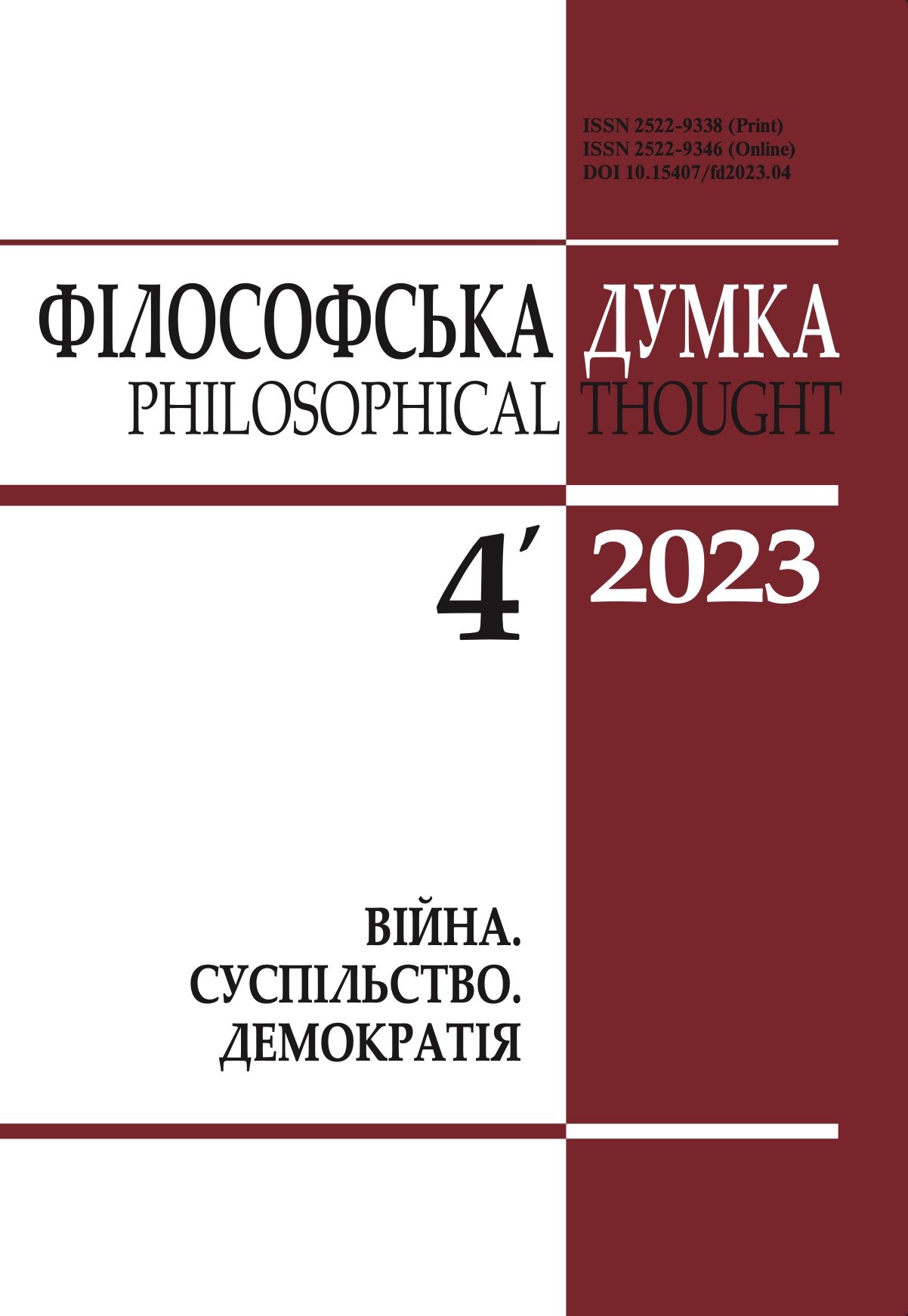WAR AS A DEVALUATION OF VALUES IN THE GLOBAL WORLD
DOI:
https://doi.org/10.15407/fd2023.04.005Keywords:
values, war, violence, globalization, society, cost, productionAbstract
The article is devoted to transformations and the crisis of values in a global world. The genealogy of values is traced as a way of existence and justification of normativity characteristic of modernity. In this context, value is compared with cost. Both the first and second are reductions inherent in the modern way of human existence. Value personifies the reduction of the complex, heterogeneous, qualitatively diverse world of external goods of pre-industrial society to a single denominator of abstract labor. Same, the complexly structured and heterogeneous reality of due acquired the appearance of a single space of values. In this context, the theoretical limitations of the pan-production view of human historical development are analyzed. The current war, which in its impact on humanity has acquired a de facto global character, is considered as a defining symptom of the crisis of values in global reality. War as a feature of the modern world is significant not in itself, but as an expression of the growing role of violence in the life of global civilization. In turn, the increase in violence and coercion is a manifestation of an even deeper process — the depreciation of values. The depreciation of values does not mean the destruction of certain specific values, but in general the role of the due in human life. In this regard, a key question arises about the prospects for overcoming the process of depreciation of values. By analogy with the three recognized paradigms of philosophizing (being, consciousness/subject, language), three historical paradigms of normativity are distinguished: transpersonal indisputable prescriptions (“commandments”); mediated by personal reflection and recognition of binding significance (values); abstinences — negative normative presumptions aimed at ensuring peaceful productive interaction with guaranteed autonomy of participants in interactions. The development of the normative practice of such abstinences may be with a possible scenario for overcoming the depreciation of values in the global world.
References
Aristotel. (2000). Polityka. [In Ukrainian]. Kyiv: Osnovy.
Habermas, Yu. (2011). Postmetaphysisches Denken. [In Ukrainian]. Kyiv: Dukh i Litera.
Yermolenko, A. (2021). Diskurs. Kommunikation. Moral. [In Ukrainian]. Kyiv: Naukova dumka.
Marx, K., Engels, F. (1965). Works. [In Ukrainian]. Kyiv: Politvydav.
Nitzshe, F. (1993). So sagte Zarathustra. [In Ukrainian]. Kyiv: Osnovy.
Olson, M. (2004). The logic of collective action. Public goods and group theory. [In Ukrainian]. Kyiv: Libra. Olson, M. (2007). Power and prosperity. Overcoming communist and capitalist dictatorships. [In Uk rainian]. Kyiv: KM Akademiia.
Proleiev, S., Zymovets, R., Kobets, R. (2023) Discourses in the global world. [In Ukrainian]. Kyiv: Dukh i Litera.
Proleiev, S., Shamrai, V. (2020). Globalization and singularity: transformation of the foundations of modern sociality. [In Ukrainian]. Filosofska dumka, 5.
https://doi.org/10.15407/fd2020.05.087
Putin, V. (2023). Interview of V.Putin by the Media Corporation of the People's Republic of China on October 17, 2023. Retrieved from: https://www.youtube.com/watch?v=afDlgQNhsjI
Rickert, H. (1910). Wert und Wirklichkeit. Vom Begriff der Philosophie /Logos. Internationale Zeit schrift für Philosophie der Kultur, 1, 1-34. Retrieved from: https://www.digizeitschriften. de/id/51032052X_1910-11_0001%7Clog13?tify=%7B%22pages%22%3A%5B29%5D%2C%22pan%22%3A%7B%22x%22%3A0.585%2C%22y%22%3A0.792%7D%2C%22view %22%3A%22info%22%2C%22zoom%22%3A0.3%7D
Rosenvalon, P. (2006). Capitalisme utopique : une histoire de l'idée de marché. [In Ukrainian]. Kyiv: KM Akademiia.
Heidegger, M. (1997). Die funf Haupttitel im Denken Nitzsches. In: Gesamtausgabe. Bd. 6.2. Frankfurt a. M.: V. Klostermann.
Kant, I. (1795). Zum ewigen Frieden. Retrieved from: https://www.gutenberg.org/cache/epub/46873/pg46873-images.html
Stanford. (2021). Value Theory // Stanford Encyclopedia of Philosophy, Retrieved from: https://plato.stanford.edu/entries/value-theory/
Downloads
-
PDF (Українська)
Downloads: 214
Published
How to Cite
Issue
Section
License
Authors who publish with this journal agree to the following terms:
- Authors retain copyright and grant the journal right of first publication.
- Authors are able to enter into separate, additional contractual arrangements for the non-exclusive distribution of the journal's published version of the work (e.g., post it to an institutional repository or publish it in a book), with an acknowledgement of its initial publication in this journal.
- Authors are permitted and encouraged to post their work online (e.g., in institutional repositories or on their website) prior to and during the submission process, as it can lead to productive exchanges, as well as earlier and greater citation of published work (See The Effect of Open Access).


